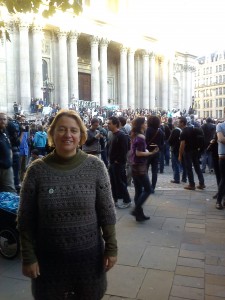The Occupation protest puts the curious non-democratic status of the City under the spotlight, argues Natalie Bennett Green Party London Assembly candidate
The Corporation of the City of London has withstood a lot. It withstood William the Conqueror, who agreed “to establish the citizens in all the rights and privileges they had hitherto enjoyed”, as he stripped every other right from the rest of England. It withstood a Royal Commission that in 1894 said it should be abolished as “so many reforms are contingent on it, and because you cannot have a complete municipality without it”. And it withstood decades of Labour policy for its abolition, from the end of World War II until just before the election of the Blair government in 1997.
Let’s not underplay the magnitude of the task that we’ve got before us. Yet in the past week this whole issue has leapt to prominence.
The Green Party passed a policy to call for the abolition of the Corporation of the City of London back in September, and that seemed at that time like a rather lonely row to hoe. (Though hat-tip to John McDonnell MP who’s long been working on this issue.) But now it’s high on the agenda of #OccupyLSX, George Monbiot is writing about it in the pages of the Guardian, and Reclaim the City is planning a big action on November 12.
There’s a lot of talk around about the need for a “new normal” in economic and political life, but the fact is that the City of London is a pretty weird “old normal”. It’s a place where some 9,000 people have votes for their local government, and businesses – mostly multinational corporations, mostly in finance, have 32,000 votes – an overwhelming weight that ensures the people have no real say at all. (That’s assuming that elections for representatives were contested, which they almost never are.)
It’s a place with some pretty serious privileges. The prime minister, if the City asks, HAS to meet them in 10 days. (With the Queen it’s a week!) And it has a special representative, called quaintly the Remembrancer, who sits behind the Speaker on the floor of the House of Commons, and has access to all legislation as it’s being drawn up – and the chance to influence it.
What’s he representing? Well this is the City’s own words: it “is committed to maintaining and enhancing the status of the City as the world’s leading international financial and business centre” – and it supports “the values of liberalisation”. (By which we can safely say they don’t mean say, the right to maintain a peaceful public protest camp…)
So how can you find out more? Well you can’t really. Because while you can use the Freedom of Information Act to find out about the City’s garbage service, or its police, all of its major operations – including all of its finances – are specifically excluded. (That’s legislation of the year 2000 remember, not 1066 or similar.)
So we know there’s a fund called the City Cash, built up over eight centuries from donations from the people of the City of London. (There was a time when the City was a valued – and even democratic force, and it still does some mildly useful charitable stuff with a fraction of its money.) We’re pretty sure the City Cash has large West End holdings, plus land in Sydney, Hong Kong and New York. And it has an income of something like £100m a year upwards.
Just imagine what we could do in London with that money – the real London. The capital could go to building affordable housing with the rents providing income, some of the existing income could greatly improve bus services, cycling and walking infrastructure… and so much more.
But above all, if we reduced the political influence of the financial industries, the building pressures on our political leaders to act to reduce inequality – to make the minimum wage a living wage, to make corporations pay their taxes and not rip off their customers , to invest in housing, transport and services – would have less counterforce against them.




4 Comments
I know this if off topic but I’m looking into starting my
own blog and was wondering what all is needed
to get setup? I’m assuming having a blog like yours would
cost a pretty penny? I’m not very web savvy so I’m
not 100% certain. Any recommendations or advice would be greatly
appreciated. Appreciate it
Picking the right location can literally mean the difference between being wildly
successful and failing miserably. There are a number of people who do the majority
of their Christmas shopping online. Corporate gift ideas are freely and widely available throughout.
They know the merchandise by the reputation of the product.
In every gathering they will go to, they can put on a quite show that
he is someone responsible that mean business.
Pins come in a variety of styles and are considered a nice little corporate gift that can be easily customized according to a company’s logo,
name or design style.
When selecting memorabilia or general purpose utility items as gifts,
avoid items such as perfume and religious or
superstitious items. The concept of these charitable hampers remains the same, however.
You can get all sorts of gifts like coffee mug, pen,
pen stand, mobile stand, wall clock and many other things.